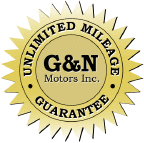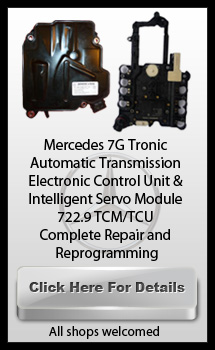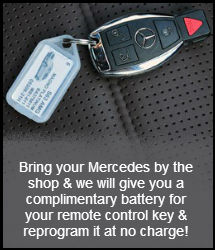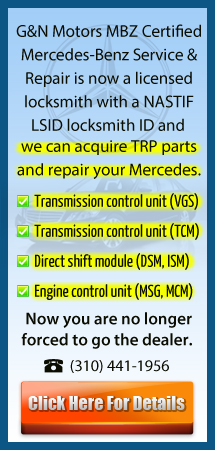Tips For Your Mercedes-Benz.
5 Tips To Help Improve Gas Mileage For Your Mercedes-Benz.
-
Limit the time you warn up your car to no more than 30 seconds. It is really not needed. It wastes gas and increases emissions.
-
The power and handling of a Mercedes-Benz makes it an especially enjoyable ride, but Aggressive driving (speeding, rapid acceleration, and hard braking) can be dangerous and consumes fuel rapidly. It can lower your highway gas mileage 33% and city mileage by 5%.
-
Use overdrive gearing when possible. This allows your vehicle's engine speed goes down resulting in gas savings and reduced wear.
-
Don't carry unneccessary junk in your Mercedes-Benz. Extra weight decreases gas mileage.
-
Reduce drag by placing items inside the vehicle or trunk rather than on roof racks. A roof rack or carrier provides additional cargo space and may allow you to buy a smaller vehicle. However, a loaded roof rack can decrease your fuel economy by 5%.
How To Keep Your Mercedes-Benz Healthy.
- Use the grade of motor oil recommended by your vehicle's manufacturer. Using different motor oil can lower your gasoline mileage by 1%-2%.
- Keep tires properly inflated and aligned to improve your gasoline mileage by around 3.3%
- Get regular engine tune-ups and vehicle maintenance checks to avoid fuel economy problems due to worn spark plugs, dragging brakes, low transmission fluid, or transmission problems.
- Replace clogged air filters to improve gas mileage by as much as 10% and protect your engine.
- Combine errands into one trip. Several short trips, each one taken from a cold start, can use twice as much fuel as one trip covering the same distance when the engine is warm.
The Safest Thing To Do When Your Brakes Are Making Noise.
If you hear a grinding or squealing sound when the pedal is applied, you probably need new brake shoes or pads. Brakes shouldn’t make any noise as they operate. Even if the actual problem turns out to be something minor, the only safe assumption is this one: noisy brakes are unsafe brakes. Postponing service is unsafe and could raise the cost of repairs later. If your brakes are making noise, get them inspected or serviced right away.
How To Tell If Your Coolant Is OK And Why You Should Care.
It is impossible to determine the condition of the coolant in the radiator just by looking at it. Coolant, a mixture of ethylene glycol and water, breaks down with age, picks up contaminants that cause sludge, and becomes acidic. When this happens, it can cause corrosion within the radiator and cooling passages of the engine. To determine its condition, coolant must be checked with coolant test strips that measure PH balance. Coolant is an environmentally hazardous substance. It pollutes the water table and is poisonous to people and animals and therefore must be disposed of as a hazardous waste. Your mechanic has special tools and procedures for testing and changing coolant.
How To Find The Correct Tire Pressure For Your Mercedes-Benz.
The correct tire pressure for a vehicle is determined by the size and weight of the vehicle, the type of tires it uses, load hauled, and the type of driving the vehicle is intended for. The vehicle manufacturer places a tire inflation placard in each vehicle that gives the proper tire inflation pressures for that vehicle. This placard is located on the inside of the glove box door, inside the fuel-filler door, or on the driver’s side doorpost (depending upon manufacturer). Most manufacturers also list tire inflation levels in the owner’s manual.
How Often Wiper Blades Need To Be Changed.
For vehicles that are parked inside, car care experts recommend that the wiper blades be replaced at least once a year or when the wiper blades start streaking - whichever comes first. On vehicles kept outside or in areas where the wipers receive excessive use, changing the blades two or even three times a year is recommended for clear vision.
Regularily Change Lube/Oil & Filter
The oil and filter collects contaminants that will damage your engine if they are not removed regularly.
Sevice Your Cooling System
The cooling system service prevents corrosion which causes the cooling system to malfunction or fail.
Change Your Transmission Oil
The transmission oil collects contaminants that can damage your transmission
Replace Your Air Filter
The air filter will become dirty, restricting air flow. This causes a loss of fuel economy and engine performance.
Brake Fluid Replacement
Brake fluid is a hydroscopic fluid which absorbs moisture and will lead to premature failure of various brake system components.
Timing Belt Replacement
Belts will wear and/or crack. This will result in belt breakage and engine damage.
Parking Brake Adjustment
Brake lining wear and cables will stretch causing the brake to malfunction.
Brake Inspection (Front/Rear)
Brake linings need to be checked for cracking, glazing, contamination and wear.
Make Sure Spark Plugs Are Good
Spark plug electrodes will corrode and cause a loss of fuel economy and engine performance if not replaced.
Check Battery
Battery terminals will corrode, causing a poor connection between the battery post and cable. An improper charge to the battery and a no start condition will result.
Rotate Tires Regularily
To obtain maximum tire mileage and performance.
Make Sure Valves Are Properly Adjusted
Proper valve clearance is critical to maintain engine performance and fuel economy.
Call Today! Experience The Difference For Yourself.
(310) 441-1956












